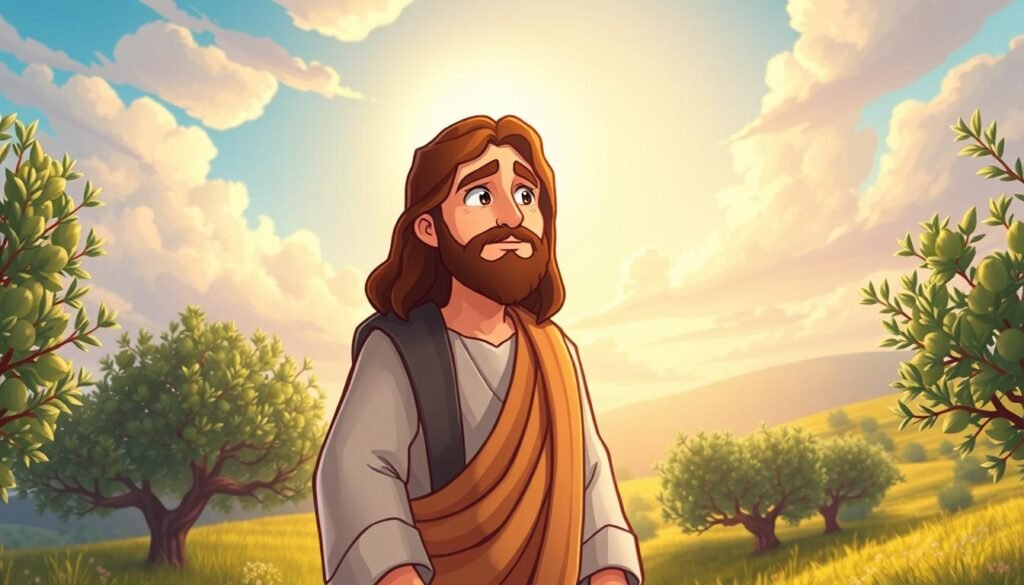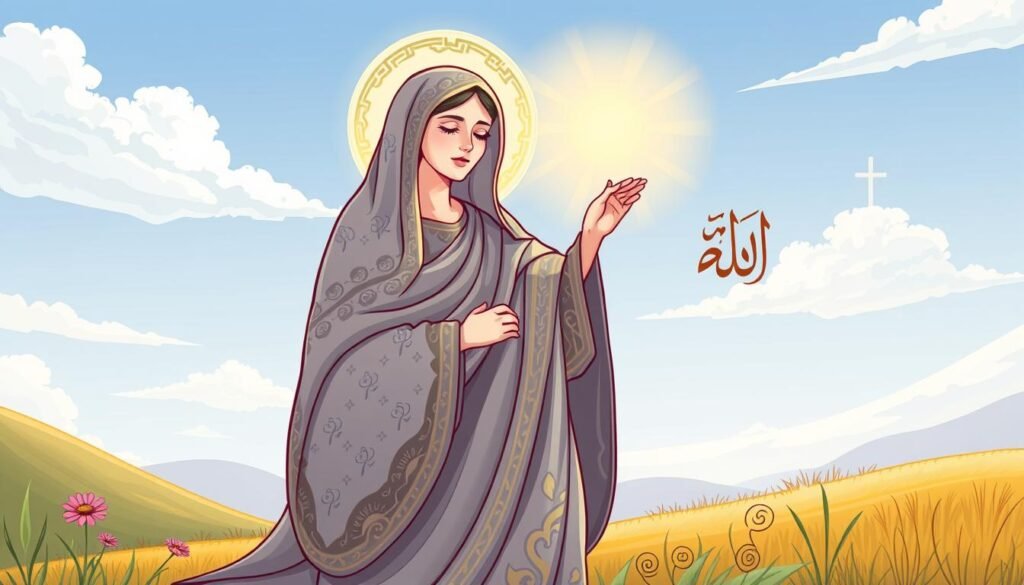Exploring the link between Islam and Christianity raises a key question. What does it mean to see Jesus as a respected prophet and messenger in Islam? This understanding gives us a peek into the role of ʿĪsā ibn Maryam (Jesus son of Mary) in Islam. It also makes us think about how Muslims see Jesus, which is different from what Christians believe.
In Islamic theology, Jesus is seen as a prophet and a servant of God. He is a key part of their faith. The Quran shows Jesus as a messenger who brought God’s message. This gives us a clear view of how Muslims see Jesus, which is different from Christian teachings.
This different view opens up a chance for dialogue between Muslims and Christians. It helps us understand and respect each other’s beliefs more. Thinking about Jesus as a prophet in Islam shows us the importance of his life and mission. It helps us see his teachings in a new light, both historically and today.
Introduction to Jesus in Islam
In Islam, Jesus is seen as a key prophet. His name is mentioned twenty-five times in the Quran. This shows how important he is.
Jesus is known as a prophet who brought God’s words to the Children of Israel. Muslims believe he is a prophet, not divine like in Christianity. He is part of a long line of great prophets, starting with Prophet Ibrahim.
Muslims admire Jesus as a spiritual leader. They call him the “Messiah” or “Masih” in the Quran. This shows his special place among prophets.
The Quran says divine guidance came through many prophets, including Jesus. He was a key figure in this spiritual journey.
Muslims see a strong bond between Prophet Muhammad and Jesus. They believe Muhammad is close to Jesus in spirit. This shows their shared mission.
In Islam, all prophets are seen as brothers. Jesus is celebrated for his miraculous birth and wisdom. His teachings and actions inspire many worldwide, encouraging us to learn more about him.
Jesus as a Prophet in Islam
The role of Jesus in Islam is deeply revered. He is seen as a prophet, important for his teachings and miracles. The Quran says Jesus was a human messenger, sent by God to guide the Children of Israel.
His message was about the oneness of God, known as tawḥīd. This supports Islam’s main idea of monotheism. Jesus’ role as a prophet is key to understanding Islam.
The Quran talks a lot about Jesus, showing his importance. His life is seen as a guide for Muslims. He is one of the five greatest messengers, known as Ul al-Azm.
Jesus’ prophethood brings messages of justice and compassion. Scholars say it helps us talk about faith and shared values.

The Quran also talks about other sacred texts, like the Torah and Gospel. It says these texts have been changed over time. This leads to discussions about the differences with Christian beliefs, especially about Jesus.
Muslims see these talks as chances for understanding, not conflict. They believe Jesus will return, bringing hope for justice and peace.
Jesus is deeply respected in Islam, showing both similarities and differences with other faiths. Talking about these ideas helps us understand each other better. Scholars like Zeki Saritoprak have studied Jesus’ role in both Christianity and Islam.
Looking into Jesus’ prophethood shows the depth of Islamic theology. It encourages everyone to see the rich stories of religions and their impact today. Understanding these relationships helps us talk and listen to each other with respect.
The Virgin Birth of Jesus
The virgin birth in Islam is a deep event showing God’s power and importance. The Quran tells us about Jesus’ birth, saying it was a miracle. It happened when Gabriel told Maryam in the Quran about it.
This event shows the special nature of Jesus’ birth. It also shows how important Maryam is in Islamic beliefs.
In both Islam and the Bible, there are seven important points about the virgin birth. These points show how old prophecies connect with Jesus’ birth. People like Isaac, Samuel, and John the Baptist are part of this story.
This story adds depth to how Muslims see Jesus’ birth. It shows a link between old and new messages from God.
Looking at Adam and Jesus together adds more to the story. Both are key figures in the history of prophets. This shows a big change in who God’s message is for.
Studies show different views on the virgin birth in Islam and the Bible. Mary is a special woman in the Quran. She is one of only eight people with a chapter named after them.
Her story is full of meaning, even before she was born. The Quran focuses on Maryam’s experience, not on Joseph, the Magi, or the manger.
Muslims see Jesus as a Prophet and Messenger. But they don’t think the virgin birth makes him God. They believe in being responsible for our actions, not in original sin or the Holy Trinity.
On Judgment Day, Jesus will help us understand our relationship with God. He will make it clear that we should not worship him as a god.
Mary: The Blessed Mother of Jesus
Mary, known as Maryam in Arabic, is very important in Islam. She is not just Jesus’ mother. Her faith, purity, and commitment make her a great example for many. The Quran talks about her virtues, dedicating a whole chapter to her.
Mary’s Significance in Islam
Mary’s importance in Islam is huge. She is seen as one of the greatest women in history. The Quran says God chose and made her pure, making her stand out among all women (Quran 3:42).
Prophet Muhammad also praised her, saying she was among the best women. Unlike some Christian beliefs, Islam sees Mary as a devoted servant of God and a good mother.
Islamic Narratives of Mary’s Life
Islamic stories about Maryam in the Quran give us a glimpse into her life. She was raised in a temple by the prophet Zechariah. Her story includes the miraculous birth of Jesus, which is key to her tale.
The Quran shows her dedication, motherly love, and the unique way she raised Jesus. These stories highlight her honor and important role in Islamic teachings.

Miracles of Jesus
The miracles of Jesus are key in Islamic stories. They show his special role as a prophet. The Quran tells us about Jesus’ amazing deeds. These stories show his divine mission and how he helped others by Allah’s will.
Performance of Miracles in the Quran
In the Quran, Jesus has many miracles. He spoke from the cradle to prove Mary’s purity. He also made birds from clay, showing his incredible powers.
He healed the blind and the leper, showing his kindness. The Quran says Jesus did these miracles with Allah’s permission. This shows no one can do miracles without God’s help.
Jesus’ Role in Healing and Blessing
Jesus’ miracles were acts of kindness, not just shows of power. He brought hope and healing to many. By raising the dead and sharing secrets, he showed a deep connection between God and people.
Each miracle taught a lesson, encouraging faith and thought. The Quran sees Jesus as a messenger of God, with a message for all. His stories teach us important lessons, like those of Noah, who also showed great faith and courage.
Who Do Muslims Think Jesus Is?
Muslims see Jesus, or Isa, as a great prophet from God. They believe he is one of many messengers. The Quran talks about Jesus 25 times, showing his importance.
Jesus’ teachings are key in Islam. He preached to worship only One God. Muslims think his message was to follow monotheism, like Moses.
Muslims don’t see Jesus as the Son of God. They don’t trust the Gospels as much as the Quran. They believe Jesus was taken up to heaven, not dying on the cross.
Islamic scholars like al-Ghazali and Ibn ‘Arabi see Jesus as a model of humanity. Muslims and Christians share some beliefs about Jesus. This shows a path for understanding between the two faiths.
The Gospel of Jesus in Islam
In Islam, the Injil is very important. Muslims think the Gospel of Jesus was a special message from God. It was meant to guide people to be good and have true faith.
The Gospel of Jesus, or Injil in Islam, teaches love, mercy, and faith in God. It’s seen as a key scripture.
Even though Muslims respect Jesus’ teachings, they believe some parts got changed over time. This change, called taḥrīf, made Jesus’ message different from the original.
The Quran talks about the Gospels in the 7th century. It says they were messages from Allah. Talking about the Gospel of Jesus can help Muslims and Christians understand each other better.
Islam sees Jesus as a big messenger of God. He was sent to the Children of Israel with a special message. His teachings can help bridge gaps between religions. For more, check out this overview of the topic.
The Crucifixion: Islamic Perspective
In Islam, the story of Jesus’ crucifixion is different from Christianity. Muslims believe Jesus was not crucified or killed. Instead, God saved him, and he was taken up to heaven.
This belief comes from the Quran. It says people at that time misunderstood what happened.
Denial of Crucifixion in the Quran
The Quran clearly says Jesus did not die in the way Christians believe. It says he won’t die until the Day of Judgment. Many Islamic scholars think the Gospels, which tell of Jesus’ death, are not true.
They believe someone else was killed in Jesus’ place. This shows most Muslims think Jesus went to heaven alive.
The Ascension of Jesus
Muslims believe Jesus’ ascension is important for future events. They think he will come back to bring justice. His return is linked to defeating the false messiah, Al-Masih ad-Dajjal.
Ahmadi Muslims have a different view. They think Jesus survived the crucifixion and preached in India. But most Muslims believe Jesus went to heaven alive. His ascension is seen as a sign of hope and divine justice.
FAQ
What is the Islamic perspective on Jesus?
How does the Quran depict Jesus?
Why is the virgin birth of Jesus significant in Islam?
What is Mary’s role in Islam?
What miracles did Jesus perform according to Islamic beliefs?
How do Muslims view the crucifixion of Jesus?
What is the Injil and its significance in Islam?

Embracing Faith, One Insight at a Time!
The teachings of the Quran have always guided my path. With a deep passion for Islamic knowledge, I strive to blend the wisdom of tradition with the relevance of today, making the timeless messages of Islam accessible and meaningful for everyone.
Muslim Culture Hub is my platform to share historical insights and thought-provoking articles, exploring both well-known and lesser-discussed aspects of Islamic culture and beliefs. My mission is to create an inclusive online space where everyone can learn, strengthen their faith, and connect with the profound message of Islam.
Join the journey!
May peace be upon you.








